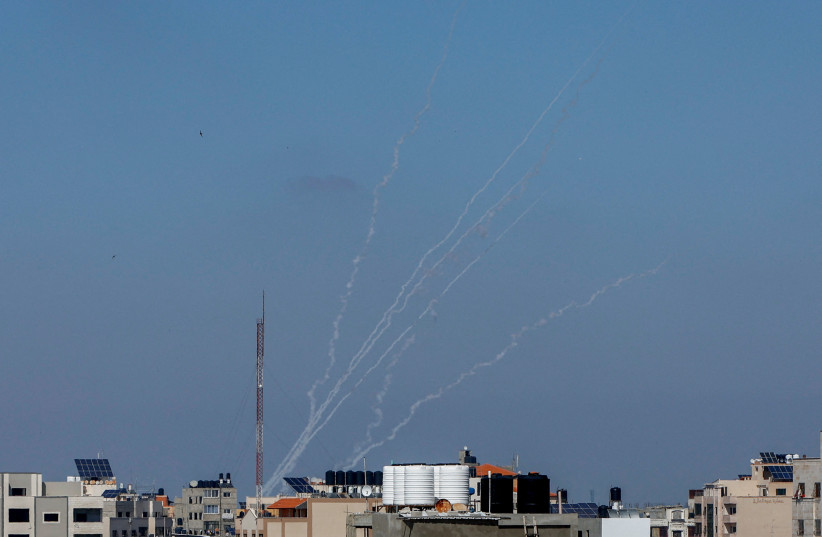Anonymous Sudan says it hacked Israeli rocket alerts, Iron Dome warning
The hacker group Anonymous Sudan claimed to have hacked Israeli rocket warning systems, including for the Iron Dome, on Tuesday amid a barrage of rockets fired from the Gaza Strip, and warned it would do so again should more rockets be launched.
The hacker group said on its Telegram channel that it had succeeded in taking down the websites of the rocket warning services Cumta, Red Alert, Halamish and Evigilo, as well as targeting some of their smartphone apps.
All four sites are still down at the time of writing, though smartphone apps seem to be functional.
It further said that it had taken down so many alert systems that the Iron Dome, Israel’s primary air defense system, wasn’t getting its full alerts, thus preventing it from intercepting everything.
A total of 22 rockets were fired from Gaza into Israel in the latest barrage. Of these, only four were intercepted, with 16 landing in open fields and two hitting an urban area. According to Israeli media reports, this gave the Iron Dome a success rate of just 67%, compared to its usual 90-95%. The IDF is currently investigating the reasons for this.
 Rockets are fired from Gaza into Israel, in Gaza May 2, 2023. (credit: MOHAMMED SALEM/REUTERS)
Rockets are fired from Gaza into Israel, in Gaza May 2, 2023. (credit: MOHAMMED SALEM/REUTERS)Anonymous Sudan credits this to their success, writing that “This is one of the reasons for the poor performance of Iron Dome today.”
Explaining further, they said that the reason four rockets were intercepted at all “is that we were a little late in the attack.”
Still, the group described this as unprecedented.
“Never in the history of [the] Iron Dome has such a large proportion of missiles been allowed to enter,” Anonymous Sudan wrote.
“Never in the history of [the] Iron Dome has such a large proportion of missiles been allowed to enter.”
Anonymous Sudan
In 2021, during the clashes between Israel and Hamas known as Operation Guardian of the Walls, a number of rockets did manage to make it through the Iron Dome security web, though experts have credited this to the sheer number of rockets fired overwhelming the Iron Dome rather than cyberwarfare.
While the exact success rate of the Iron Dome in this recent rocket barrage is unclear, at least two rockets did strike the urban area of Sderot.
Anonymous Sudan further vowed to attack Israel’s warning systems again should more rockets be fired.
Another rocket was fired into Israel from Gaza during Prime Minister Benjamin Netanyahu’s security meeting, landing in an open field, Army Radio reported. Apart from a notification in the Home Front Command app, none of the other warning systems gave any rocket alerts.
However, the hacker group did issue what it described as an apology for this most recent cyberattack, saying it should have been faster.
“We sincerely apologize that we are a bit late in bringing down the alarm system, due to the current weakness of the Internet in Sudan, and unfortunately there is a great deal of outage.”
Anonymous Sudan, apologizing for being late to hack Israeli warning systems
“We sincerely apologize that we are a bit late in bringing down the alarm system, due to the current weakness of the Internet in Sudan, and unfortunately there is a great deal of outage,” the group wrote over Telegram.
They further said they are working on more attacks on Israel’s Internet, noting that they have achieved success thus far.
“We are 100% sure that there have been disturbances in the Internet,” Anonymous Sudan wrote. “Expect an Internet outage at any moment.”
Who are Anonymous Sudan?
Anonymous Sudan is a hacker group that has taken credit for several notable cyberattacks against Israel in recent months.
On April 27, the group claimed it was responsible for wide-ranging power outages throughout Israel, writing “Is darkness good? Why don’t you have electricity?”
On April 14, the group claimed responsibility for a cyberattack that struck the Israel Post as well as Bank Leumi, Discount Bank, Mizrahi-Tefahot, Bank Mercantile, Bank Benleumi (First International Bank of Israel) and its subsidiaries Bank Otzar Ha-hayal and Bank Massad.
The group has also launched cyberattacks taking down other Israeli news sites n the past, such as The Jerusalem Post, KAN and i24.
At the start of April, they also managed to hit the website of cybersecurity firm Check Point as well as that of United Hatzalah.





Comments are closed.